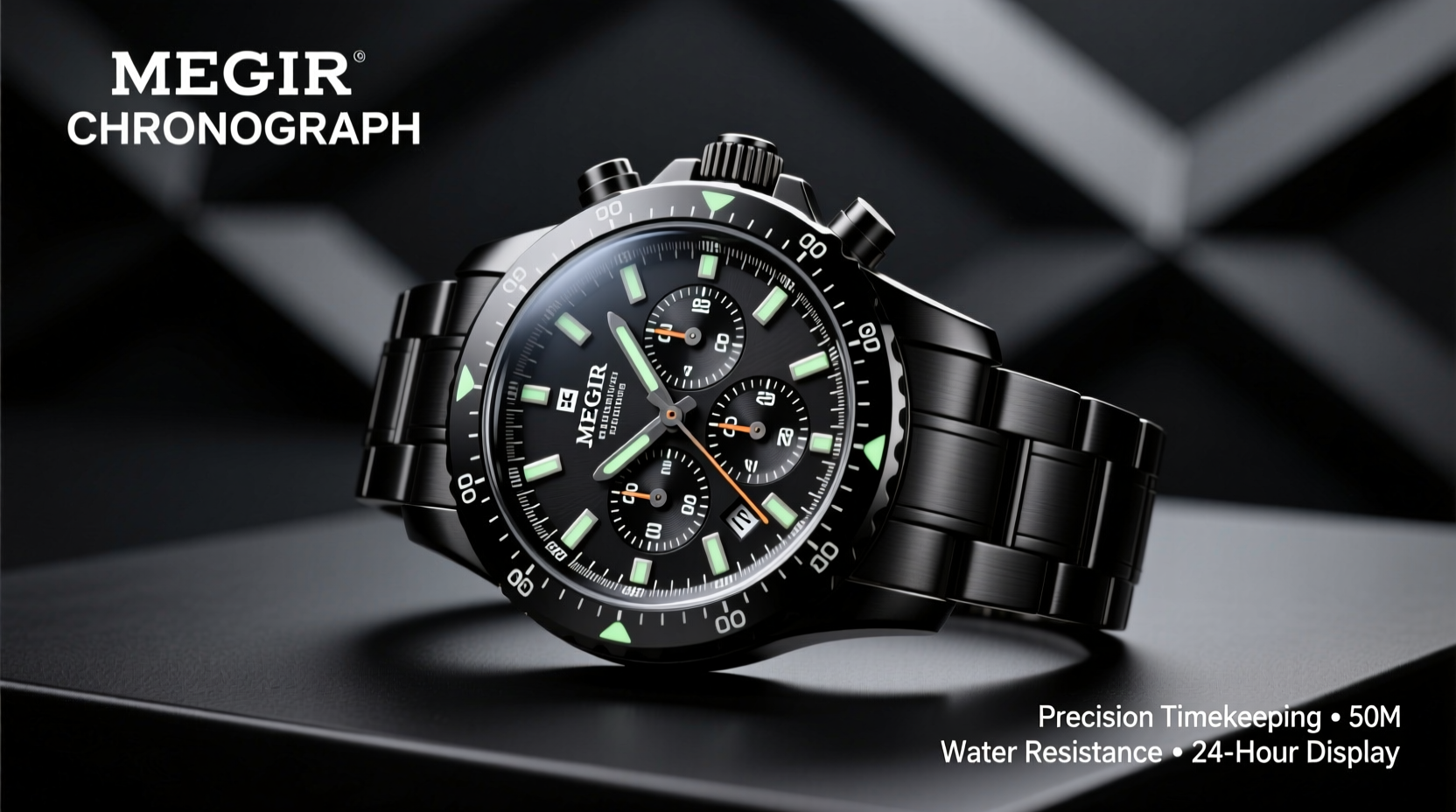The Megir chronograph watch blends classic design with functional precision, offering an accessible entry into the world of mechanical-style timepieces. While it may not carry the price tag of luxury Swiss brands, its value lies in versatility, durability, and the ability to perform like a professional-grade instrument when used correctly. However, many owners underutilize their watches—misreading subdials, neglecting proper calibration, or misunderstanding how to operate the stopwatch functions. This guide breaks down every essential aspect of your Megir chronograph, from setting the time to leveraging advanced features with confidence.
Understanding Your Megir Chronograph: Key Components

Before using any function, familiarize yourself with the physical layout of your watch. Most Megir chronographs follow a standard three-subdial configuration (30-minute counter at 3 o’clock, small seconds at 6 o’clock, and 1/10th second or running seconds at 9 o’clock), though variations exist depending on model number. The crown typically has two positions: pulled out halfway for date adjustment and fully extended for time setting. Two pushers flank the crown—top for starting/stopping the chronograph, bottom for resetting.
- Crown: Controls time and date settings.
- Top Pusher: Starts and stops the chronograph hand.
- Bottom Pusher: Resets the chronograph to zero.
- Main Dial: Displays hours and minutes via central hands.
- Subdials: Track elapsed seconds, minutes, and sometimes fractions of a second.
Step-by-Step Guide to Setting Time, Date, and Using the Chronograph
Operating your Megir chronograph accurately ensures reliable readings and prevents internal mechanism strain. Follow this sequence carefully.
- Pull the crown gently to first position (halfway out) to adjust the date. Rotate clockwise until the correct date appears in the window. Avoid changing the date between 9 PM and 3 AM, as the mechanism is engaged and may be damaged.
- Pull the crown fully outward to set the time. Turn clockwise or counterclockwise until the hour and minute hands align precisely with the reference time. As you move the hands past 12, observe whether the date changes accordingly.
- Push the crown back in completely and ensure it’s tightened against the case to preserve water resistance.
- To use the chronograph: Press the top pusher once to start the stopwatch. Press again to stop. Then press the bottom pusher to reset all chronograph hands to zero. Never reset while timing is active—always stop first.
“Chronograph accuracy depends on user discipline. Misuse of pushers can lead to gear slippage over time.” — Carlos Mendez, Watch Mechanic & Horology Instructor
Maximizing Accuracy: Calibration and Maintenance Tips
Megir watches are quartz-powered in most models, meaning they rely on battery-operated movements rather than manual winding. Quartz provides excellent short-term accuracy but still requires periodic attention. Typical deviation is ±20 seconds per month, which is acceptable for casual wear but may drift if exposed to magnetic fields or extreme temperatures.
Best Practices for Long-Term Precision
- Avoid placing the watch near speakers, phones, or magnetic clasps that can disrupt the movement.
- Replace the battery every 18–24 months—even if it still runs—to prevent leakage damage.
- Keep the watch clean with a soft microfiber cloth; wipe after exposure to sweat or moisture.
- Have the seals checked annually if you frequently expose the watch to water.
Feature Comparison: Common Megir Chronograph Models
Different Megir models offer varying levels of functionality. Below is a comparison of popular variants to help identify what your watch can do.
| Model | Chronograph Range | Date Display | Water Resistance | Special Features |
|---|---|---|---|---|
| Megir 3050 | 30 minutes | Yes | 3 ATM (splash-proof) | Luminous hands, stainless steel case |
| Megir 9099 | 60 minutes | Yes | 5 ATM (swimming-safe) | Tachymeter bezel, mineral crystal |
| Megir 8207 | 30 minutes | No | 3 ATM | Sleek minimalist face, leather strap option |
| Megir 7011 | 12 hours | Yes | 5 ATM | Day-date display, dual-time zone capability |
If your model includes a tachymeter scale on the bezel, you can measure speed based on travel time over a known distance. For example, if you start the chronograph at the beginning of a kilometer marker and stop at the next, the chronograph second hand will point to your average speed in km/h.
Real-World Example: Timing a Morning Run
Jamal, a fitness enthusiast, uses his Megir 9099 to track his weekly sprints. Before starting, he resets the chronograph by pressing the bottom pusher (after ensuring it’s stopped). At the start line, he presses the top pusher to begin timing. After completing 400 meters in 1 minute 22 seconds, he stops the timer. The main chronograph hand shows 22 seconds on the outer dial, while the 30-minute subdial indicates 1 minute. He then resets before his next lap. By consistently using the correct sequence, Jamal avoids misreads and maintains confidence in his data.
Common Mistakes and How to Avoid Them
Even experienced users make errors that compromise function or longevity. Recognizing these pitfalls helps extend your watch’s life.
- Resetting without stopping: Pressing the reset button while the chronograph is running can damage internal gears.
- Ignoring battery health: Leaving a dead battery inside can corrode contacts and ruin the movement.
- Adjusting date during sensitive hours: Changing the date between 9 PM and 3 AM risks misalignment.
- Exposing to excessive moisture: Even 5 ATM-rated watches shouldn’t be worn in hot showers—heat opens seals.
Do’s and Don’ts Summary
| Action | Do | Don't |
|---|---|---|
| Setting the date | Use first crown position outside 9 PM–3 AM window | Force changes late at night |
| Using chronograph | Start → Stop → Reset in order | Press reset while timing is active |
| Battery replacement | Replace every 2 years; use professional service | Wait until the watch stops completely |
| Cleaning | Wipe with dry cloth; rinse with fresh water after swimming | Soak in chemicals or use abrasive cleaners |
Frequently Asked Questions
Why does my chronograph second hand not return to zero?
This “zero offset” occurs due to minor mechanical drift. Some Megir models allow re-zeroing via a service tool. If the misalignment exceeds 5 seconds, consider professional calibration.
Can I swim with my Megir chronograph?
Only if it has at least 5 ATM (50m) water resistance. Check your model’s rating. Never operate pushers underwater, even on water-resistant models.
How do I know when the battery needs replacing?
Signs include the seconds hand jumping in 2- or 4-second intervals (end-of-life indicator), dim lume, or complete stoppage. Replace promptly to avoid leakage.
Final Checklist: Mastering Your Megir Chronograph
- Verify your model’s specifications (water resistance, chronograph range).
- Set the time and date correctly, avoiding restricted hours.
- Practice starting, stopping, and resetting the chronograph in order.
- Sync your watch weekly with a trusted time source.
- Schedule battery replacement every 18–24 months.
- Avoid magnets, shocks, and extreme temperatures.
- Inspect seals and cleanliness annually.
Conclusion: Take Pride in Precision
Your Megir chronograph is more than just a fashion accessory—it's a tool designed for measurement, consistency, and personal accountability. When operated with care and understanding, it delivers reliable performance for workouts, meetings, travel, and everyday time management. Mastery doesn’t come from owning a luxury brand but from knowing how to use what you have to its fullest potential. Whether you're timing laps, managing work sprints, or simply appreciating mechanical elegance, take a moment each day to engage with your watch intentionally.









 浙公网安备
33010002000092号
浙公网安备
33010002000092号 浙B2-20120091-4
浙B2-20120091-4
Comments
No comments yet. Why don't you start the discussion?